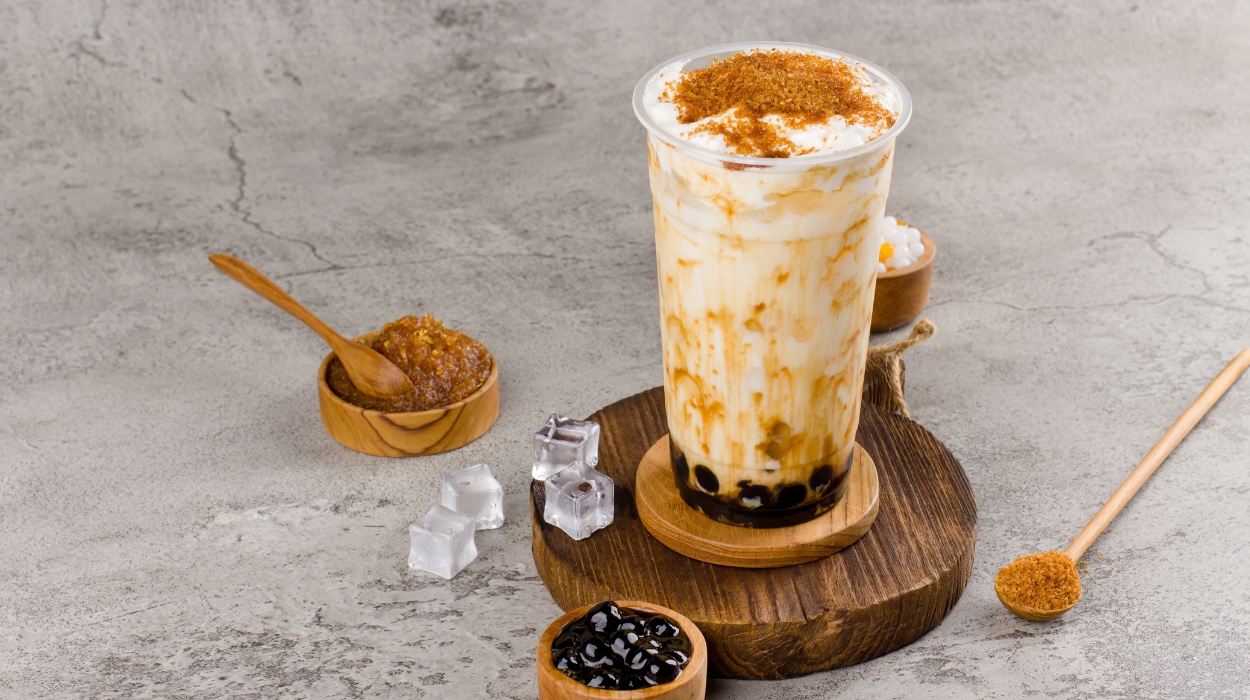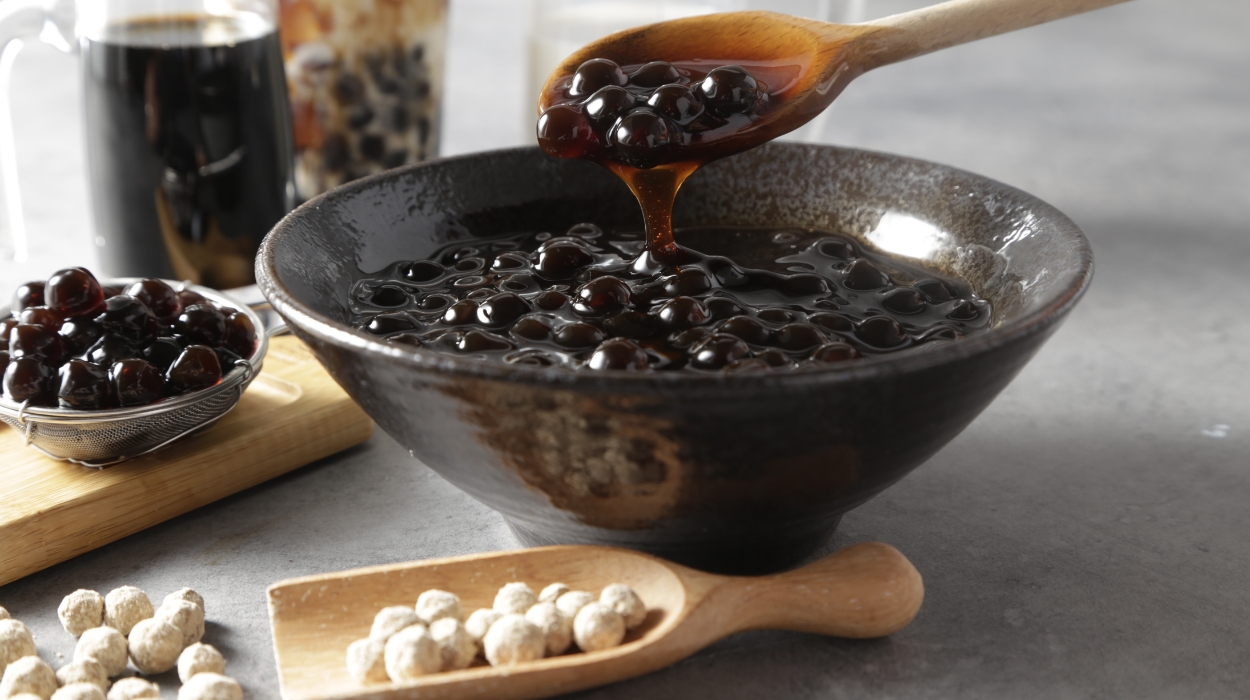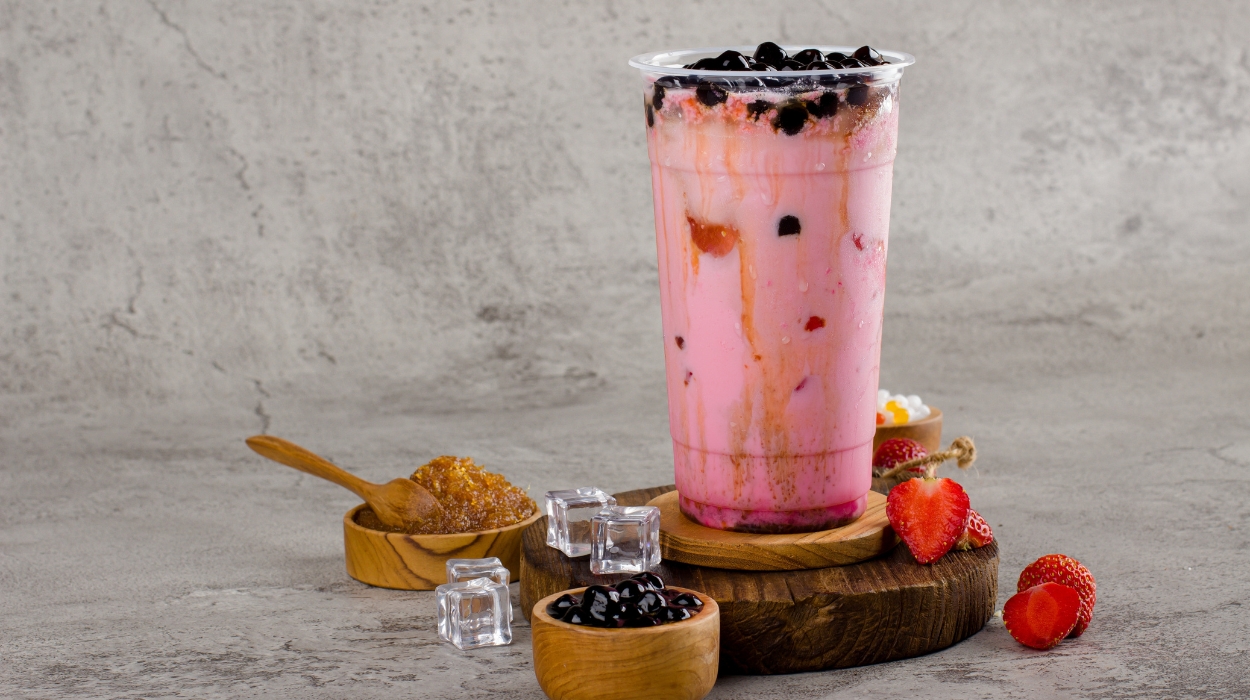 Expert's opinion
Expert's opinion
Expert's opinion
The article is a subjective view on this topic written by writers specializing in medical writing.
It may reflect on a personal journey surrounding struggles with an illness or medical condition, involve product comparisons, diet considerations, or other health-related opinions.
Although the view is entirely that of the writer, it is based on academic experiences and scientific research they have conducted; it is fact-checked by a team of degreed medical experts, and validated by sources attached to the article.
The numbers in parenthesis (1,2,3) will take you to clickable links to related scientific papers.
Is Boba Vegan? All There Is To Know On Boba In 2024

Boba is a plant-based tea garnisher that has piqued the interest of the vegan community. It originated in Taiwan but has recently gained popularity in the United States. However, is boba vegan? In its natural form, boba is vegan because it is derived from cassava starch.[1]
Typically, the boba used as a bubble tea topping is vegan and wholly plant-based. Popping boba, also called Popping Pearls, is also vegan because it is made from components suitable for vegans. However, many bubble tea shops use products that aren’t vegan, such as cow’s milk used to make traditional bubble tea.
Read on for in-depth insights regarding boba types and how to determine if your boba is truly vegan.
Is Boba Vegan-Friendly?
Not always. Boba is usually considered vegan as it is prepared from cassava starch. However, some ingredients used in its preparation are not always plant-based, rendering many commercial varieties of boba non-vegan. To be truly vegan, animal-based ingredients must be replaced with plant-based ones.
This includes the refined sugar often used to soak boba; beet sugar or organic sugar must be used, not cane sugar or honey.
Is Boba Vegan? How Can Vegans Eat Boba?

Is boba tea vegan? The ingredients used and the type of boba determines whether vegans can consume boba. For example, gelatin[2] must not have been employed to produce tapioca pearls.
This is because gelatin is derived from animals, and vegans oppose the idea of animals being tortured to obtain gelatin or any other substance.
Fortunately, cassava starch is the primary component of tapioca pearls in most cases. Only the added flavors and sweeteners must be considered, which is simple if the boba is homemade.
Consumers of commercial boba, on the other hand, should check the ingredients used for vegan compatibility. When drafting the ingredient list, some boba dealers may exclude non-vegan items accidentally or intentionally. Some vegans do not consume things made with cane sugar, as refined sugar is often made with bone char, an animal derivative.
However, vegan meal delivery can help reduce the likelihood of receiving non-vegan boba.
Many vegans now enjoy boba in their tea to increase their dietary variety as long as they know the ingredients used to prepare it. Regular milk bubble tea, for example, is not vegan-friendly, as it contains dairy milk.
However, other types of vegan bubble tea, like green tea or tea made with non-dairy milk like soy milk and almond milk, may be suitable for vegan consumption.
It’s also recommended to avoid toppings such as egg pudding and cheese foam if you follow a vegan diet. In addition, it’s helpful to look for plant-based additives and supplements with nutritious vegan food choices like green powder for a balanced vegan diet.
What Is Boba?
Boba are little chewy balls produced from tapioca starch and derived from cassava. It was originally created in the 1980s for various Taiwanese desserts.[3] It is now extensively utilized in tapioca pearl and bubble milk tea production.
When added to tea, boba layers at the bottom. It also settles evenly in smoothies, coffees, and slushies. Vegan people enjoy it as a vegan-friendly beverage or can be paired alongside vegan foods.
The tapioca pearls in tea or any other beverage can vary in size. However, the straws provided by vegan bubble tea vendors are often thick enough to fit all sizes.
The starch is kneaded into dough after it has simmered for some time. The dough is then rolled, cut into tiny pearls, and immersed in water for around 30 minutes.
One may use this relatively simple technique to create the balls at home for their favorite cocktails. Boba preserves its quality for about three hours after cooking. Therefore it should be consumed as quickly as possible.
What Does Boba Taste Like?
Boba is flavorless in its original state, so if you want to ensure you get vegan boba, ask for clear boba. Most other commercial boba, however, is sweetened throughout the preparation procedure. First, the starch is soaked in sugary water.[1] Caramel, vanilla, or brown sugar might be found in the heated sugar syrup, and brown sugar may contain cane sugar which is not vegan.
Traditional coffee and tea establishments frequently sell prepared boba. Boba is also available in Taiwanese bubble tea cafes and the refrigerated section of Asian supermarkets. It comes in various flavors, depending on the sweeteners added during the simmering process.
Most bubble tea vendors provide a variety of flavors, including melon, Thai, strawberry, and matcha. When high-quality boba melts in the mouth, it is chewy and soft but not overly spongy. Most vegans supplement their healthy diet for weight reduction with vegan-friendly boba.
But because of its sugar content, it should be consumed in moderation.
Variety Of Boba
Boba is available in various flavors, some of which are suitable for use in a balanced vegan diet. Although it may be brownish or tan before boiling, the classic version is commonly labeled clear boba. It is composed entirely of cassava root powder and can replenish the vitamins and minerals vegans require.
Black Boba
Black boba is a closely related type. It looks like a typical boba but may contain caramel coloring, making it appear more black in color. This coloring is created from malt and corn syrup. The dark hue can also come from boba sweetened with brown sugar.
The brown sugar added to boba may contain cane sugar processed with animal products, such as bone char,[4] for sugar refining. Therefore, some varieties of black boba cannot be considered vegan.
Flavored Boba

Flavored boba is another popular option. It is conventional boba, but it has been flavored. Boba manufacturers flavor the dough with syrups or dry ingredients. Vegan-friendly syrups and dry ingredients are typically sourced from fruits and vegetables.
To ensure you get what you need on a vegan diet, it is also recommended to supplement your fruits and veggies if you are not eating a balanced diet.
Popping Boba
One of the popular milk teas is Popping Boba. It differs significantly from the traditional kind because a chemical reaction between calcium chloride and sodium alginate makes it.[5] This type of boba is made from starch, water, fructose, and seaweed.
When these ingredients are combined, they form a hollow ball filled with a flavoring agent, usually grass jelly or fruit juice.
So, is popping boba vegan? Popping boba is only vegan if all ingredients used in its preparation are plant-based.
Non-Vegan Ingredients In Some Boba To Avoid
Some boba products contain additional artificial flavors, sweeteners, and colors that may be unsuitable for vegans.
Refined Sugar
The type of sugar used is potentially one of the offenders because it may include traces of animal-derived substances or use animal substances in processing. When some manufacturers make certain sugars, they use bone char for refining, which makes it non-vegan.
When creating boba at home, it is best to use beet sugar, organic sugar, or coconut sugar. White cane sugar is not a vegan choice. Although it is derived from sugarcane, manufacturers whiten it with bone char. On the other hand, other plant-based natural sweeteners[6] are viable alternatives as long as they are not filtered with bone char.
Honey
Honey is also used to produce sweetening syrup but is not vegan. It is obtained by exploiting honeybees, so vegans should avoid it. Plant-based sweeteners such as maple or date syrup can be used in its stead.
Caramel
Another non-vegan ingredient found in some boba types is caramel.[7] This ingredient is typically created with a high dairy, sweetened condensed milk, and butter concentration. The vegan option is plant-based caramel from natural sugars such as organic sugar, beet sugar, or coconut sugar.
Dairy Milk
Milk is another frequent non-vegan product that everyone who has chosen veganism should avoid. It is used as a flavoring in some commercial boba variants and, in this case, would be listed as an ingredient.
The Takeaway
While cassava starch is used to make boba, several ingredients used in its production are not always vegan. However, you can easily make boba vegan-friendly when you omit animal-sourced ingredients like gelatin, cane sugar, honey, and dairy in your recipes. Having tasty boba: Vegan boba snacks can fit nicely into a vegan diet or meal replacement plan.
Frequently Asked Questions
Yes, it is made from cassava starch.
Fruit tea, coffee, smoothies made with plant-based milk, and all other beverages free from cane sugar, milk, and honey are free from animal-derived ingredients.
Not all of the time. Some boba flavors are made entirely of plant-based ingredients. Therefore, it’s best to check the label or with the manager of your local bubble tea cafe.
No, as they are occasionally made with non-vegan caramel.
Not all of the time. Some bubble tea flavors contain non-vegan ingredients, such as milk. You also need to know what type of sugar was used in the bubble tea.
You can make vegan boba at home with the right plant-based ingredients.
Non-vegan ingredients in boba include gelatin, caramel, brown sugar, cane sugar, honey, and milk.
+ 7 sources
Health Canal avoids using tertiary references. We have strict sourcing guidelines and rely on peer-reviewed studies, academic researches from medical associations and institutions. To ensure the accuracy of articles in Health Canal, you can read more about the editorial process here
- Kaur, B., Yu, R., Ng, G. and Henry, J. (2022). Comparison of boba pearls made from tapioca starch and other unconventional flours and starches: Their… [online] ResearchGate. Available at: https://www.researchgate.net/publication/366273072_Comparison_of_boba_pearls_made_from_tapioca_starch_and_other_unconventional_flours_and_starches_Their_glycaemic_response_GR.
- Михайлов, О.В. (2023). Gelatin as It Is: History and Modernity. International Journal of Molecular Sciences, [online] 24(4), pp.3583–3583. doi:https://doi.org/10.3390/ijms24043583.
- Jae Eun Min, Green, D.B. and Kim, L. (2016). Calories and sugars in boba milk tea: implications for obesity risk in Asian Pacific Islanders. Food Science and Nutrition, [online] 5(1), pp.38–45. doi:https://doi.org/10.1002/fsn3.362.
- Jia, P., Tan, H., Liu, K. and Gao, W. (2018). Synthesis and Photocatalytic Performance of ZnO/Bone Char Composite. Materials, [online] 11(10), pp.1981–1981. doi:https://doi.org/10.3390/ma11101981.
- Roxana Gheorghita Puscaselu, Andrei Lobiuc, Mihai Dimian and Mihai Covașă (2020). Alginate: From Food Industry to Biomedical Applications and Management of Metabolic Disorders. Polymers, [online] 12(10), pp.2417–2417. doi:https://doi.org/10.3390/polym12102417.
- Katarzyna Świa̧der, Wegner, K., Piotrowska, A. and Sadowska, A. (2019). Plants as a source of natural high-intensity sweeteners: a review. [online] ResearchGate. Available at: https://www.researchgate.net/publication/336073869_Plants_as_a_source_of_natural_high-intensity_sweeteners_a_review.
- Garima Sengar and Harish Kumar Sharma (2012). Food caramels: a review. Journal of Food Science and Technology, [online] 51(9), pp.1686–1696. doi:https://doi.org/10.1007/s13197-012-0633-z.



